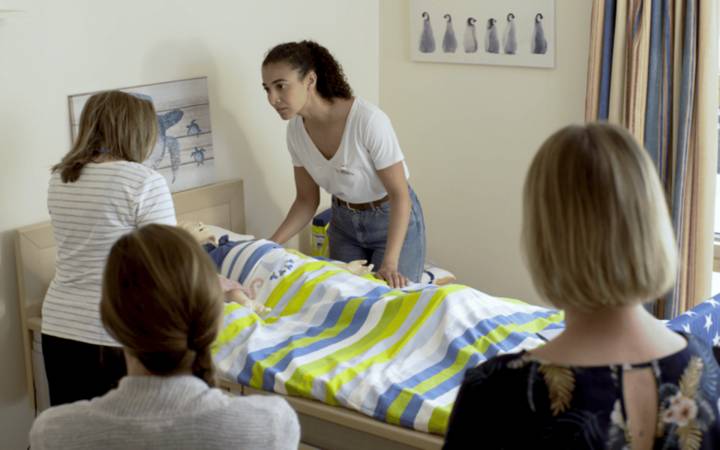New approach to managing chronic knee pain hailed as best practice
Posted Thursday 27 June 2013
 A programme helping patients to manage their own chronic knee pain, based at Kingston University and St George's, University of London, has been hailed as a national example of good healthcare practice.
A programme helping patients to manage their own chronic knee pain, based at Kingston University and St George's, University of London, has been hailed as a national example of good healthcare practice.
The project demonstrates how group physiotherapy can achieve as effective results as single-patient sessions in equipping patients to self manage chronic knee pain, for around half the cost. Following a successful trial at Sevenoaks Hospital, the scheme has been singled out as a case study by the government's National Institute of Health and Clinical Excellence Quality (NICE).
NICE's Quality, Innovation, Productivity and Prevention (QIPP) programme provides a collection of case studies of health and social care initiatives proven to improve quality and productivity across the health service. The aim is to offer a resource for health and social care professionals to share and adopt the best ideas.
Professor Mike Hurley, of the Faculty of Health, Social Care and Education, run jointly by Kingston and St George's, developed the Enabling Self-management and Coping for Arthritic Pain through Exercise (ESCAPE-pain) programme in 2000.
The programme integrates patient education, coping strategies, and a challenging exercise regimen that demonstrates to participants how exercise is a safe and effective way of helping them self manage their problem.
"The case study brings this work to a wider audience as QIPP works closely with the Department of Health and NHS Confederation to get word out," Professor Hurley, who is based at the Faculty's School of Rehabilitation Sciences, said. "That's great as we're keen to see this programme implemented as widely as possible, in response to the positive feedback from clinicians."
 The experiences of patients and clinicians at the Physiotherapy Outpatient Department at Sevenoaks Hospital of the programme's effectiveness, ease of implementation, fulfilment of needs and cost efficiencies were so positive that, following the study in 2009, they still use the programme as their intervention of choice for people referred with chronic knee, hip and back pain. After hearing about the programme, other local and national physiotherapy outpatient departments have now adopted it, and it has been commissioned for use across Kent in the next year.
The experiences of patients and clinicians at the Physiotherapy Outpatient Department at Sevenoaks Hospital of the programme's effectiveness, ease of implementation, fulfilment of needs and cost efficiencies were so positive that, following the study in 2009, they still use the programme as their intervention of choice for people referred with chronic knee, hip and back pain. After hearing about the programme, other local and national physiotherapy outpatient departments have now adopted it, and it has been commissioned for use across Kent in the next year.
"We've done a number of studies evaluating ESCAPE-pain and its success made us very keen to implement it in clinical departments," Professor Hurley said. "We found that we haven't had to do much to convince clinicians that this method works. Once they've tried it they seem happy to implement it."
Current treatment for chronic knee pain is really pretty woeful, Professor Hurley said. "It involves getting drugs from your GP and advice about exercises, but GPs will admit this doesn't really work. We know that exercise does work but a lot of people don't keep it up when they're left to do it on their own."
Professor Hurley and his team found no difference in the clinical effect between group therapy and one-to-one sessions, but found that the communal aspect, with shared learning and a support structure, was really important in ensuring patients kept up their exercises.
The case study Self management for chronic knee pain: using group physiotherapy to teach exercises and coping strategies, is available on the NICE website.
Contact us
General enquiries:
Journalists only:
- Communications team
Tel: +44 (0)20 8417 3034
Email us



